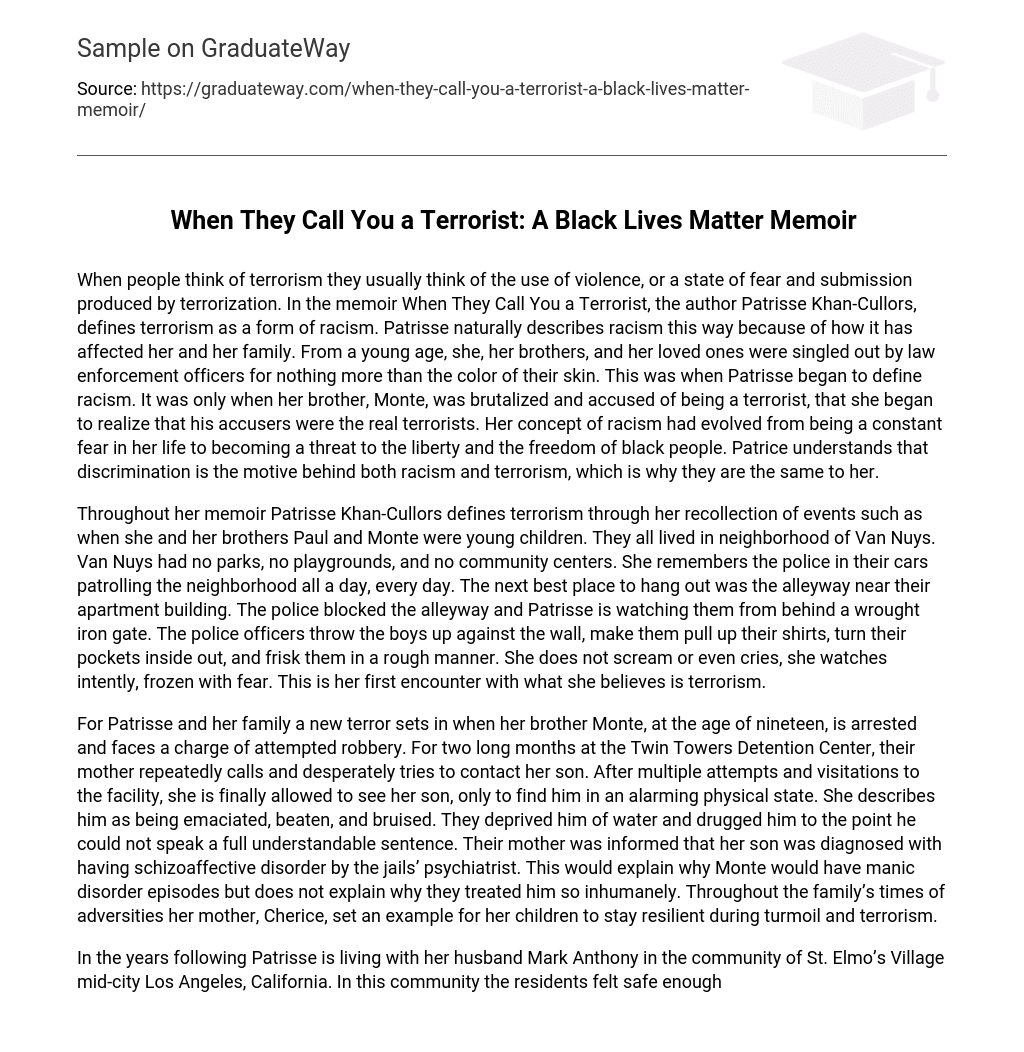When people think of terrorism they usually think of the use of violence, or a state of fear and submission produced by terrorization. In the memoir When They Call You a Terrorist, the author Patrisse Khan-Cullors, defines terrorism as a form of racism. Patrisse naturally describes racism this way because of how it has affected her and her family. From a young age, she, her brothers, and her loved ones were singled out by law enforcement officers for nothing more than the color of their skin. This was when Patrisse began to define racism. It was only when her brother, Monte, was brutalized and accused of being a terrorist, that she began to realize that his accusers were the real terrorists. Her concept of racism had evolved from being a constant fear in her life to becoming a threat to the liberty and the freedom of black people. Patrice understands that discrimination is the motive behind both racism and terrorism, which is why they are the same to her.
Throughout her memoir Patrisse Khan-Cullors defines terrorism through her recollection of events such as when she and her brothers Paul and Monte were young children. They all lived in neighborhood of Van Nuys. Van Nuys had no parks, no playgrounds, and no community centers. She remembers the police in their cars patrolling the neighborhood all a day, every day. The next best place to hang out was the alleyway near their apartment building. The police blocked the alleyway and Patrisse is watching them from behind a wrought iron gate. The police officers throw the boys up against the wall, make them pull up their shirts, turn their pockets inside out, and frisk them in a rough manner. She does not scream or even cries, she watches intently, frozen with fear. This is her first encounter with what she believes is terrorism.
For Patrisse and her family a new terror sets in when her brother Monte, at the age of nineteen, is arrested and faces a charge of attempted robbery. For two long months at the Twin Towers Detention Center, their mother repeatedly calls and desperately tries to contact her son. After multiple attempts and visitations to the facility, she is finally allowed to see her son, only to find him in an alarming physical state. She describes him as being emaciated, beaten, and bruised. They deprived him of water and drugged him to the point he could not speak a full understandable sentence. Their mother was informed that her son was diagnosed with having schizoaffective disorder by the jails’ psychiatrist. This would explain why Monte would have manic disorder episodes but does not explain why they treated him so inhumanely. Throughout the family’s times of adversities her mother, Cherice, set an example for her children to stay resilient during turmoil and terrorism.
In the years following Patrisse is living with her husband Mark Anthony in the community of St. Elmo’s Village mid-city Los Angeles, California. In this community the residents felt safe enough not to lock their doors. One late morning upon Patrisse arriving back from spending time with friends she encountered the police raiding her home. The police gained access through the back door, yanked her husband out of bed and arrested him. The police explained that he fits the description of a person of interest who was related to several robberies in the area.
“Close your eyes and come close. Try to imagine with me: You are a graduate student whose work is in Chinese medicine. Your dream is to be a healer. And maybe while you are sleeping in your wife’s bed, where artist live and children come for free painting classes, maybe you are dreaming that you are saving a life, and in the midst of that dreaming, you are yanked out of bed by armed men dressed in riot gear, who possess no warrant, who have snuck into your bedroom through an unlocked back door. Their only reasoning is that you “fit the description” (Khan-Cullors 195).
Patrisse describes not being afraid, but feeling angry when she sees her husband, the healer, in hand cuffs and demands a better explanation as to why they are accusing him based on his profile. The police eventually backed down as neighbors start taking a stand with Patrisse and Mark Anthony, and finally they remove the hand cuffs.
The following textural evidence conveys that racial bias is still an ominous issue in today’s world. “Police in the California city, where only 6% of the population is black, worked with federal authorities to arrest 37 people, all of whom were black, for selling small amounts of drugs, the American Civil Liberties Union of Northern California said in a complaint announced on Thursday, October 4, 2018. During the operations, one undercover officer was caught on camera declining to buy drugs from an Asian woman and waiting to buy from a black woman, who was later prosecuted. The suit focused on San Francisco police collaborations with the US Drug Enforcement Administration and federal prosecutors in 2013 and 2014, but the ACLU has alleged that the discriminatory policing and harassment of black people in the city has continued. We’ve seen time and time again how racial bias has infected the San Francisco police department’s ability to administer equal enforcement of the law,” Novella Coleman, an ACLU staff attorney, said in an interview” (Levin).
Those who have not had the same experiences as Patrisse may argue that comparing racism with terrorism is too much of a stretch. However, it is because of these encounters that Patrisse has had with racism, that she makes this connection. She has witnessed the unjustified brutality, prejudices, and horrific acts that have been placed upon her race. These are the same conditions one would see in a setting filled with terrorist activity. Patrisse has taken her life’s experiences and has become a courageous visionary.





